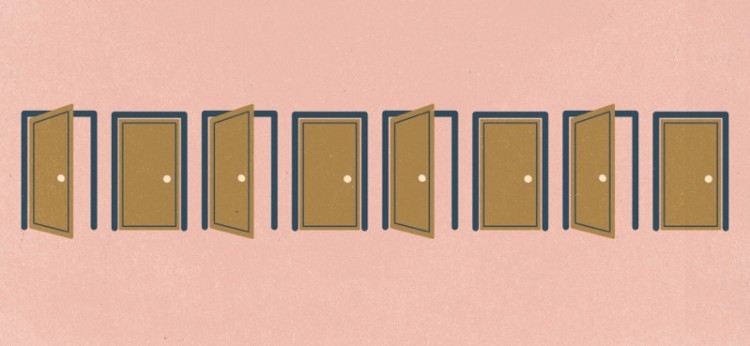Opening and Closing Doors Repetitively Won't Keep People From Dying
When my roommate jokingly said I should start this piece with, “You down with OCD? Yeah you know me!” I initially thought it couldn’t be quite as terrible as my urge to drop an “Arrested Development” reference by calling it The O.C. Disorder (don’t call it that). It’s still pretty cheesy, but it’s easier to poke fun at a problem via revised Naughty by Nature lyrics now that I’ve gotten it more under control than it was when I was younger, though it was harder to get to this point when I had no idea that my behaviors could be diagnosed with an actual name – obsessive-compulsive disorder.
My OCD took its form in both obsessions and compulsions (you really can have it all!), which means I had recurring, intrusive thoughts combined with repetitive actions I’d perform under the belief that these horrible thoughts wouldn’t come true as long as I completed these particular tasks. This is where the fear plays in – all of the bizarre habits that consumed a lot of my time and energy throughout the day traced back to these irrational fears I was trying to have control over.
Essentially, my brain was telling me that if I did something like turning the light switch in my room on and off a certain amount of times until it felt okay to me, everyone I know and love wouldn’t die immediately that day. Super chill notion to have when you’re 7 years old and should just be trying to get through recess without ripping another pair of tights from your school uniform instead of protecting your family from imminent death.
 Photo art by Robyn Kanner
Photo art by Robyn Kanner
It was also less evident to my family that what I was doing could be categorized as obsessive-compulsive disorder. They just sorta chalked it up to being another weird thing Meghan does, like that Christmas I spent refusing to open my eyes while unwrapping presents, or when I wanted to be a dog so badly and my supportive grandma told my mother to “let her live out her dreams” and placed a bowl of water on the floor, which I then lapped up like a dog.
I garnered the nickname “Willy Wonka” from my siblings because one of my OCD habits was walking up and down a few stairs repetitively before going down them completely, like that scene where Gene Wilder first brings the group into the The Chocolate Room and does that, but in a more delightful manner while singing. And not influenced by the thought of cancer inflicting all of them.
I couldn’t really argue with them that what I was doing wasn’t strange because I didn’t know other people conducted these types of daily rituals for similar reasons until I came across reality shows featuring OCD patients, including MTV’s “True Life” and VH1’s “The OCD Project.” I hate thanking reality TV for anything besides making me feel better about my life while feeling worse for rich people, but this time it helped me acknowledge the connection I was forcing between my fears and my habits.
Some of these fears might creep into my mind at a lower intensity today, but now I can recognize that turning the sink on and off an unreasonable amount of times (to the point where I’m starting to think I might somehow be responsible for all of California’s droughts in the ’90s) doesn’t hold the key to the universe in terms of keeping certain people alive. Or getting in and out of bed before finally lying down to go to sleep isn’t what will prevent me from being possessed by the devil. This special fear made it onto my long list after I forced my friends to watch “The Exorcist” at my 13th birthday sleepover – not exactly the “feel-good movie about puberty” I may have pitched it as.
Accepting that I don’t have control over these things has allowed me to manage my OCD instead of it taking over my life as it did when I was going through puberty myself, sans rotating head spewing green vomit. And instead of feeling ashamed about it, like I was as a child, I feel more empowered to talk about it openly and relate to other people who went through the same thing.
Hopefully, more examples in media that accurately discuss OCD and its symptoms will pop up more frequently, such as in HBO’s “Girls.” Otherwise, people might mistakenly continue to think they’re “sooo OCD” for keeping a neat apartment, and not because they believe it will stop the Bubonic Plague from resurfacing and only wreaking havoc on their favorite people. I still love what you’ve done with the place, though!
RELATED: I Have OCD. This Is What It’s Like to Be in My Mind for 3 Minutes.
This post originally appeared on Femsplain.
The Mighty is asking its readers the following: Describe the moment someone changed the way you think about disability and/or disease. If you’d like to participate, please send a blog post to community@themighty.com. Please include a photo for the piece, a photo of yourself and 1-2 sentence bio.
Want to end the stigma around mental illness? Like us on Facebook.
And sign up for what we hope will be your favorite thing to read at night.
